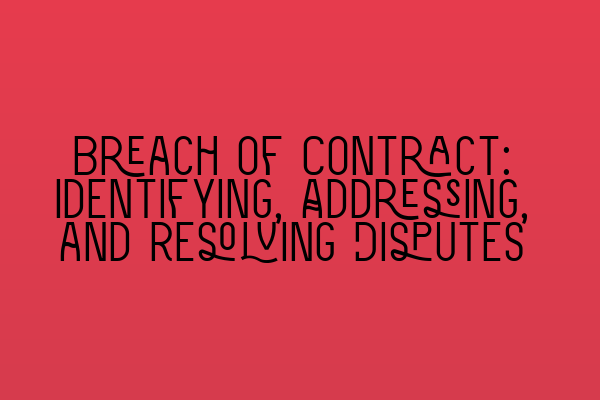Breach of Contract: Identifying, Addressing, and Resolving Disputes
In the business world, contracts are an essential part of conducting transactions. They outline the rights and obligations of each party involved and provide a legal framework for the agreement. However, there are times when one party fails to fulfill their obligations, resulting in a breach of contract.
A breach of contract occurs when one party fails to perform a specific term or condition as agreed upon in the contract. This can include failing to make a payment, delivering goods of subpar quality, or not providing the agreed-upon services. When a breach occurs, it is crucial to identify it, address the issue, and work towards resolving the dispute.
Identifying a Breach of Contract
Identifying a breach of contract starts by carefully reviewing the terms and conditions laid out in the contract. It is essential to have a thorough understanding of the agreement to determine whether a breach has occurred. Common signs of a breach include:
- Non-payment or late payments
- Failure to deliver goods or services
- Failure to meet performance standards
- Violation of non-disclosure or confidentiality agreements
- Non-compliance with contract terms
If any of these signs are present, it is important to gather evidence to support your claim. This may include contract documents, invoices, emails, or any other relevant communication.
Addressing the Breach
Once a breach of contract is identified, the next step is to address the issue. This can be done through communication and negotiation with the party in breach. It is essential to approach the situation professionally and constructively to increase the likelihood of a successful resolution.
When addressing the breach, it may be helpful to remind the party in breach of their obligations as outlined in the contract. Clearly state the specific terms that have been violated and provide any supporting evidence. It is important to give the other party an opportunity to rectify the breach or offer suitable compensation.
If communication and negotiation fail to resolve the issue, it may be necessary to seek legal advice and consider legal action. An experienced contract law solicitor can provide guidance on the appropriate steps to take and help pursue a resolution through the legal system if necessary.
Resolving the Dispute
Resolving a breach of contract dispute can be a complex process, but there are several methods that can be employed to reach a resolution:
- Mediation: In mediation, a neutral third party facilitates discussions between the parties involved to help them find a mutually agreeable solution. Mediation can be a cost-effective and efficient way to resolve disputes without resorting to litigation.
- Arbitration: Arbitration involves presenting the dispute to an impartial arbitrator who will consider the evidence and make a binding decision. This can be a more formal and structured process than mediation.
- Litigation: If all else fails, litigation may be necessary. This involves taking the dispute to court, where a judge will make a final decision based on the evidence presented. Litigation can be a time-consuming and expensive process, so it should be a last resort.
Each method of dispute resolution has its advantages and disadvantages, and the best approach will depend on the specific circumstances of the case. Consulting with a contract law solicitor can help determine the most appropriate course of action.
In conclusion, a breach of contract can disrupt business relationships and lead to financial losses. By identifying breaches, addressing the issue promptly, and exploring various methods of dispute resolution, parties can work towards resolving the conflict and protecting their rights. Legal advice and guidance from an experienced contract law solicitor can be invaluable in navigating the complexities of breach of contract disputes.
For further resources on SQE preparation and related topics, check out these articles:
- Top Resources for SQE Preparation: Tools to Help You Succeed
- SQE Mock Debrief Sessions: Analyzing Your Performance for Growth
- The Importance of Mocks in SQE Preparation: A Game Changer
- SQE Answer Keys: Unraveling the Mystery of Correct Answers
- Unveiling the Solicitors Qualifying Examination (SQE): What You Need to Know
